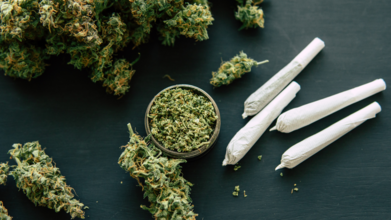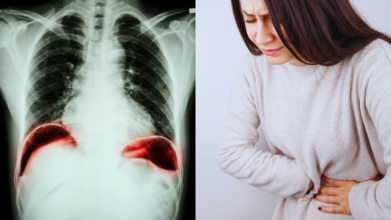- Health Conditions A-Z
- Health & Wellness
- Nutrition
- Fitness
- Health News
- Ayurveda
- Videos
- Medicine A-Z
- Parenting
- Web Stories
Russian President Putin Carries A 'Poop Suitcase' With Him: What Does Stool Reveal About One's Health?

Credits: AP and Canva
When Russian President Vladimir Putin travelled to Alaska last week for the Russia-US summit, reports noted a rather unusual detail. Along with his security entourage and official staff, Putin’s guards carried a special ‘poop suitcase’, a container meant to collect and secure the President’s fecal matter.
According to French magazine Paris Match, investigative journalists Regis Gente and Mikhail Rubin revealed that members of Putin’s Federal Protection Service (FPS) have been tasked for years with gathering his waste during foreign trips. The collected matter is then discreetly transported back to Russia.
The practice, which dates back to Putin’s rise to power in 1999, was also reported by BBC journalist Farida Rustamova, who noted that during past trips, including a visit to France in 2017, the Russian leader relied on portable toilets.
The reason? Preventing foreign intelligence agencies from accessing his stool, reports The Week. Experts speculate that even a small sample of bodily waste could provide sensitive information about a leader’s health.
While the security angle is unusual, it highlights an important fact: our poop says a lot about our health. Doctors routinely recommend stool tests, which can reveal infections, digestive issues, and even early signs of cancer.
What Does A Poop Tell About Your Health: Why Do You Need A Stool Test?
A stool test involves analyzing a sample of feces to detect potential health problems. Doctors use it to check for pathogens such as bacteria, viruses, or parasites that can make a person sick.
These tests can also detect hidden blood, fat, or DNA changes, clues that something more serious might be happening inside the body.
Healthcare providers often recommend stool tests when symptoms appear, such as:
- Blood or mucus in stool
- Persistent diarrhea
- Severe stomach pain or cramping
- Nausea or vomiting lasting several days
- Fever with digestive distress
- Conditions a Stool Test Can Detect
Stool analysis is a diagnostic tool because it offers a non-invasive look into the gastrointestinal system. Conditions that can be identified include:
Infections: Bacterial, viral, or parasitic infections often show up in stool cultures.
Colorectal cancer: Hidden blood or DNA mutations in stool can suggest early cancer.
Anemia: Blood loss in the digestive tract can signal anemia.
Inflammatory bowel disease (IBD): Chronic irritation of the digestive tract may be detected.
Gastrointestinal bleeding: Even small traces of blood can be found through stool testing.
Digestive disorders: Conditions like celiac disease, pancreatitis, or malabsorption syndromes leave clear signs in stool composition.
Also Read: What Is Alkaptonuria? The Rare Disease That Turns Your Pee Black – Here’s Why
Types of Stool Tests
Not all stool tests are the same. Doctors choose based on a patient’s symptoms and risk factors:
Fecal occult blood test (FOBT): Detects hidden blood in stool, which may indicate ulcers, cancer, or bleeding in the gut.
Fecal immunochemical test (FIT) and FIT-DNA: Checks for tiny amounts of blood and abnormal DNA that may point to precancerous conditions.
Tests for infections: Includes microscopic analysis, cultures, or DNA-based tests to identify harmful microbes.
What Stool Appearance Can Signal
Doctors often remind patients that simple changes in poop, its color, texture, or shape, can provide important health insights:
Oily or greasy stools: May mean fat isn’t being digested properly, possibly due to celiac disease or pancreatic problems.
Pencil-thin stools: If persistent, could signal an obstruction in the colon or irritable bowel syndrome.
Color changes: Food and gut bacteria often affect color, but black or bloody stool should never be ignored, as it may indicate bleeding or cancer.
Rocks and pebbles: Hard, lumpy stools point to constipation, often caused by dehydration, poor diet, or sluggish intestinal movement.
First-Of-Its Kind Study On Head And Neck Cancer, Researchers Find Whether Weed Could Negatively Affect Treatment

The debate about how weed or cannabis supplements are health friendly are not has been going on for a while. While there are certain benefits of it for psychological health, it still has physical consequences. When it comes to surgeries and healing, there are many things that need to be considered.
Doctors know that many cancer patients use cannabis to help with symptoms like nausea, pain, and anxiety. In fact, some studies show that more than half of cancer patients, and up to 80% of those who also smoke tobacco, use it. But there's a big missing piece of information: How does cannabis use affect the body’s ability to heal from surgery?
As we know, smoking negatively affects how well your wounds heal, however, when we swap the components to cannabis, how different is the effect?
How Does Cannabis Affect Recovery From Cancer Surgery?
To answer this, Dr. Lurdes Queimado at the University of Oklahoma is leading a first-of-its-kind study focused on patients with head and neck cancers. These cancers are becoming more common, fueled by smoking, heavy drinking, and HPV infections.
The primary treatment for them is often surgery, which can be life-changing, as it often alters a person's appearance and affects their ability to breathe and swallow. Because of these intense surgeries, patients often need reconstructive surgery afterward. The goal of this research is to give doctors clear, reliable information so they can properly advise their patients on how cannabis might affect their recovery.
How the Study Works
This study will follow 220 adult patients over a six-month recovery period after their surgery. It's unique because it's a "prospective" study, meaning the researchers are tracking patients as they heal, rather than just looking at old records. To make sure the data is accurate, they’ll also use blood tests to confirm if patients are using cannabis.
- Cannabis users
- Tobacco users
- Both cannabis and tobacco users
- Those who use neither
Over the six months, the research team will closely watch each patient for infections, bleeding, and other medical complications. They’ll also carefully assess how well their scars are healing. The study will also explore if the way someone uses cannabis—whether by smoking, vaping, or using edibles—makes a difference in their recovery.
What Doctors Expect to Find
Based on some early research, Dr. Queimado and her team have a hypothesis: smoking cannabis could have a negative impact on wound healing. Their initial findings suggest that even in healthy people, cannabis can increase inflammation and weaken the immune system. Both of these effects could potentially slow down healing and lead to more problems after surgery.
This research could have a huge impact. Not only could it help patients with head and neck cancer, but it could also provide valuable information about how cannabis affects other chronic diseases where inflammation and a strong immune system are important. Ultimately, the findings could shed light on how cannabis interacts with other cancer treatments like chemotherapy and radiation, giving doctors a much clearer picture of its overall effects on a patient's health.
Why Do Doctors Always Ask You To Finish The Antibiotic Course? Know What Makes It So Crucial

Credits: Canva
When penicillin first burst onto the medical scene in the 1940s, it was nothing short of revolutionary. Infections that had previously claimed millions of lives could suddenly be conquered with a few shots. The world sighed in relief. But fast-forward less than a century, and the miracle drug is showing cracks in its armour. Not because science has run out of answers, but because humans have a bad habit of abusing them.
Antimicrobial resistance (AMR) has quietly crept into headlines as the “silent pandemic”. Unlike COVID-19, there are no nightly dashboards, no masks, and no lockdowns. Yet the World Health Organisation warns that by 2050, more people may die from drug-resistant infections than from cancer today. And for India, the largest consumer of antibiotics globally, the warning bell rings loudest.
India’s Antibiotic Affair
India’s relationship with antibiotics is a complicated one. They are life-saving and indispensable in hospitals, yet their easy availability has made misuse rampant. A 2022 Lancet study revealed India has one of the world’s highest antibiotic usage rates, much of it unregulated.
Two patterns stand out:
1. The wrong use: People pop antibiotics for viral infections like colds and flu, where they are as effective as chewing bubble gum.
2. The half-finished story: Even when prescribed correctly, many patients ditch the course midway once symptoms ease. The infection is not wiped out completely, and the surviving bacteria adapt, coming back stronger and resistant.
This is how India finds itself stuck in a paradox: antibiotics are being both overused and underused at the same time.
Everyday Misuse, Global Consequences
A patient with a throat infection feels better after two days of pills and decides to quit. Seems harmless, right? Wrong. Those leftover bacteria mutate into resistant strains, and unlike stubborn house guests, they do not stay put. They spread to families, hospitals, and even entire communities.
Doctors across India now face cases where ordinary infections do not respond to standard antibiotics. They are forced to switch to stronger drugs with more side effects. In extreme cases, even newer antibiotics fail, leaving doctors with no treatment options at all.
Why Doctors Push To “Finish the Antibiotic Course”
The science behind it is straightforward. An antibiotic regimen is designed to kill bacteria completely. Stop midway, and you have only eliminated the weaklings. The stronger ones survive, thrive, and breed. This breeding ground is how “superbugs” are born, bacteria that laugh in the face of our best medicines.
This is not a distant threat. Indian hospitals already report rising cases of drug-resistant tuberculosis (TB), urinary tract infections, and bloodstream infections. These are no longer rare ICU cases; they are showing up in regular wards, affecting everyday patients.
The Expert Weighs In
“We see the unforeseen consequences of antibiotic misuse every day. Most patients do not realise antibiotics are not painkillers but highly specialised weapons against bacteria. If misused, these weapons lose their power not just for one patient but for society," says Jeevan Kasara, Board Chairman at Steris Healthcare, adding that finishing the entire course is not a suggestion; it is a medical necessity.
"Skipping doses risks breeding resistant strains that can make even routine infections deadly. This is a ticking time bomb. India must act with better education, tighter pharmacy regulations, and stronger public awareness campaigns," he adds.
What Needs to Change
India’s antibiotic misuse cannot be solved overnight, but the fixes are clear:
- Patient awareness: People need to understand antibiotics are not to be taken casually, and courses must be completed without fail.
- Pharmacy control: Over-the-counter sales continue despite rules. Strict enforcement is a must.
- Doctor-patient talk: Doctors should clearly explain why antibiotics are prescribed and the dangers of stopping early.
- National policies: India has a National Action Plan on AMR, but state-level execution and public campaigns are patchy. Implementation, not intention, is what counts.
A Shared Responsibility
It is tempting to blame only doctors or pharmacies, but antibiotic misuse is everyone’s problem. A patient who cuts short their course contributes to resistance. A pharmacy that hands out antibiotics casually fuels the fire. Policymakers who downplay AMR are essentially pushing medicine back into the pre-penicillin era.
Why Does My Stomach Hurt After Eating? Unique Symptoms Of Peptic Ulcer Causing Burning Pain

Credits: Canva
We have all been there. You polish off a hearty meal, lean back with satisfaction and then comes that all-too-familiar burn in your stomach. For most people, the quick fix is to blame the food and pop an antacid. But what if that nagging pain is not just about what you ate?
According to Dr Akash Chaudhary, Clinical Director and Sr Consultant Medical Gastroenterology at Care Hospitals, Hyderabad, “That familiar burn after a meal might seem harmless at first. But when it starts showing up regularly, especially during long gaps between meals or waking you up at night, it could be your body signalling something more serious, like a peptic ulcer.”
What Is a Peptic Ulcer?
A peptic ulcer is basically a sore that develops on the inner lining of your stomach or the upper part of your small intestine. These sores form when the protective lining of the stomach wears down. “This kind of damage is often due to an H. pylori infection or the regular use of pain-relief medication like NSAIDs,” Dr Chaudhary explains. Without that protective cushion, the very acid that digests your food ends up irritating and damaging your stomach instead.
Unique Symptoms of Peptic Ulcer You Might Miss
Ulcers do not always announce themselves with big warning signs. Dr Pavan Reddy Thondapu, HOD of Medical Gastroenterology at Arete Hospitals, says that what often begins as “minor digestive discomfort, a burning sensation, early satiety, or bloating after meals can sometimes signal something more serious if ignored.”
Other tell-tale but easily overlooked signs include:
- Upper abdominal pain that keeps coming back, often worse after meals
- Unexpected nausea or changes in appetite
- Feeling unusually full too quickly (early satiety)
- Black, tarry stools or vomiting blood in advanced cases
- Unexplained tiredness, weight loss, or loss of appetite
Most people dismiss these symptoms as routine acidity or indigestion. But as Dr Chaudhary warns, “When the real cause goes unnoticed, ulcers can quietly progress, sometimes leading to bleeding or even a tear in the stomach lining.”
Why Antacids Do Not Always Cut It
Reaching for an antacid may calm the discomfort for a few hours, but it does not solve the underlying issue. “It is not uncommon for patients to self-medicate and ignore early symptoms, but that often delays recovery and increases risk,” Dr Thondapu points out. Antacids mask the pain, but the ulcer continues its work quietly in the background, setting the stage for bigger problems.
When to See a Doctor
The golden rule, if the burning pain keeps returning, especially after meals or early in the morning, is to not wait it out. According to Dr Chaudhary, “If someone experiences persistent burning pain after meals, they shouldn’t delay medical attention. What feels like a routine gastric issue may be a more serious condition silently progressing in the background.”
Red flag symptoms that warrant immediate medical evaluation include:
- Vomiting blood or black stools
- Difficulty swallowing
- Severe, persistent upper abdominal pain
- Unexplained weight loss or fatigue
How Doctors Get to the Bottom of It
Thankfully, diagnosing a peptic ulcer is not as scary as it sounds. “We usually diagnose peptic ulcers through simple procedures like an upper GI endoscopy or a breath test for H. pylori,” says Dr Thondapu. An endoscopy gives a direct look at the stomach lining, while non-invasive tests can quickly confirm an infection.
The Road to Healing
Ulcers are highly treatable once detected. Treatment usually involves:
- Acid-suppressing medications to give the stomach lining a chance to heal
- Antibiotics if H. pylori is detected
- Stopping or adjusting long-term NSAID use
- Simple but powerful lifestyle shifts
Dr Chaudhary emphasises that “with the right medicines and a few mindful shifts in daily eating habits, most people begin to feel better within weeks.”
Important Lifestyle Tweaks
Treatment is not just about pills; how you live day to day plays a big role in preventing recurrence. Dr Thondapu recommends:
- Eating meals on time instead of long gaps or binge-eating sessions
- Cutting back on alcohol and tobacco
- Avoiding overly spicy, oily, or processed foods
- Managing stress through exercise, yoga, or mindfulness
These shifts help protect the stomach lining and keep acid levels in check, making ulcers less likely to return. In a nutshell, stomach pain after meals does not always mean you overdid it on the food. Sometimes it is your body’s way of flagging a deeper issue. As both experts stress, ignoring persistent burning pain or bloating is not worth the risk. Early diagnosis makes ulcers easy to treat, while delay can lead to serious complications.
© 2024 Bennett, Coleman & Company Limited

